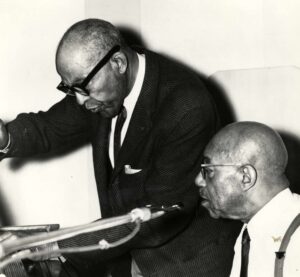YOUR DAILY DOSE OF EUBIE!!!
A key ragtime revivalist who helped promote Eubie in the early ‘60s was the Detroit-born performer/pianist “Ragtime” Bob Darch, who first wrote to Eubie to introduce himself in fall 1958. Like other performers of this era, Darch was primarily an entertainer, mixing humorous anecdotes, nostalgic songs, and showy and fast ragtime solos to draw a mainstream audience. His stage presentation was a highly romanticized version of the kind of pianists who entertained in the bars and brothels of Eubie’s youth. Darch’s larger-than-life personality and attraction to younger musicians is captured in this memory by pop music scholar Ian Whitcombe, who met the pianist in the early ‘60s: “In 1964 I was in Seattle, having established myself as an entertainer in a local coffee house and having parlayed my way into a recording contract as a future rock star with a local label. My recording manager and I were sitting in a swell hotel talking turkey over Jack Daniel’s when my attention was deflected … by that certain sound of ‘Maple Leaf Rag’ … I rushed into the room from whence came the glorious music and there he was! Straw hat and everything, pounding out the good news. To the consternation of my manager I spent the next few days in the company of Ragtime Bob. Songs, stories, jokes came pouring out of this avuncular genius as I followed him around like Boswell followed Dr. Johnson in 18th century London. I hung on every gravelly word, I vowed to remember the lyric of every song gem that kept falling from him as we walked and talked and drank and drank. … One evening we, together with my local girlfriend, were having dinner in the home of a wealthy local couple when in came their young son to say goodnight. Later Bob trapped me in the wet bar to inform me that the boy was really his son. Even later my girlfriend emerged from the powder room to tell me that Bob had proposed to her. I put the whole matter aside because I so admired the man’s art.”

In about 1959, Darch was hired as the house pianist for Club 76 in Toronto, where he would become a popular performer through the mid-‘60s. A year into his employment, he convinced the management to bring Eubie Blake to the club to perform, a rare early date for the pianist as a ragtime player. This led to a friendship between the two players, and Darch would do much to popularize Eubie and his music among his own audience. More importantly, he convinced his record label to record Eubie along with two other old-timers, songwriter/composer Joe Jordan and pianist Charlie Thompson, on a 1962 album released as Golden Reunion in Ragtime. The cover featured the “headline” “Ragtime Bob Darch presents…” along with a small cameo photo of Darch, a clever PR move to get the album into the hands of Darch’s audience who would not know these older pianists’ names.
The album appeared on the small Stereo-Oddities label that was operated by entrepreneur/recording engineer Fletcher Smith out of Florida, far from the centers of the entertainment world. The label had its initial success with comedy albums and novelties like Darch’s ragtime music. The Golden Reunion album must have been successful enough that Smith considered recording an entire solo album by Eubie; he wrote to the pianist: “I’ve been toying around with the idea of having you come down here by yourself to do an album entitled EUBIE BLAKE PLAYS EUBIE BLAKE. These would all be your own tunes whether or not they are ragtime. We would back you up with about five musicians … See if you can think of 12 tunes like this that would show your career as a composer.”
Smith envisioned the album as representing Blake’s entire career, beginning with his ragtime work but encompassing his later Broadway and solo piano compositions in semi-classical style. Blake went so far as to make a demo tape, asking for 7 to 10 accompanists for the recording, apparently envisioning a more orchestral setting for his work rather than a small jazz combo. Whether Smith balked at the extra expense or simply decided the market was too small, the discussions ended in October and no album was recorded.